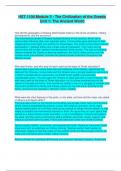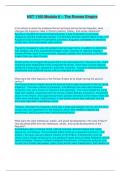Hst 1100 module 3 - Study guides, Class notes & Summaries
Looking for the best study guides, study notes and summaries about Hst 1100 module 3? On this page you'll find 3 study documents about Hst 1100 module 3.
All 3 results
Sort by

-
HST 1100 Module 3 - The Civilization of the Greeks Unit 1: The Ancient World
- Exam (elaborations) • 4 pages • 2023
-
Available in package deal
-
- $10.49
- + learn more
HST 1100 Module 3 - The Civilization of the Greeks Unit 1: The Ancient World How did the geography of Greece affect Greek history in the terms of politics, military developments, and the economy? The mountainous terrain of Greece isolated Greeks of one another, which led to communities following their own separate paths. Communities grew attached to their independence and fought one another for advantages. The small communities fostered participation in political affairs and unique cultural ex...

-
HST 1100 Module 1 - The Ancient near East: The First Civilizations
- Exam (elaborations) • 5 pages • 2023
-
Available in package deal
-
- $10.49
- + learn more
HST 1100 Module 1 - The Ancient near East: The First Civilizations What are the characteristics of civilization? 1. an urban focus: cities became the centers of political, economic, social, cultural, and religious development; 2. a distinct religious structure: the gods were deemed crucial to the community's success, and professional priestly classes, as stewards of the gods' property, regulated relations with the gods; 3. new political and military structures: an organized government bureauc...

-
HST 1100 Module 6 – The Roman Empire
- Exam (elaborations) • 4 pages • 2023
-
Available in package deal
-
- $10.99
- + learn more
HST 1100 Module 6 – The Roman Empire In his efforts to solve the problems Rome had faced during the late Republic, what changes did Augustus make in Rome's political, military, and social institutions? Augustus changed the governmental structure, it was comprised of a princeps (Augustus) and the aristocratic senate. The Senate's decrees had the effect of law, and Augustus could overrule the senatorial governors. Augustus' candidates for elections usually won, which decreased voter turnout....

$6.50 for your textbook summary multiplied by 100 fellow students... Do the math: that's a lot of money! Don't be a thief of your own wallet and start uploading yours now. Discover all about earning on Stuvia


